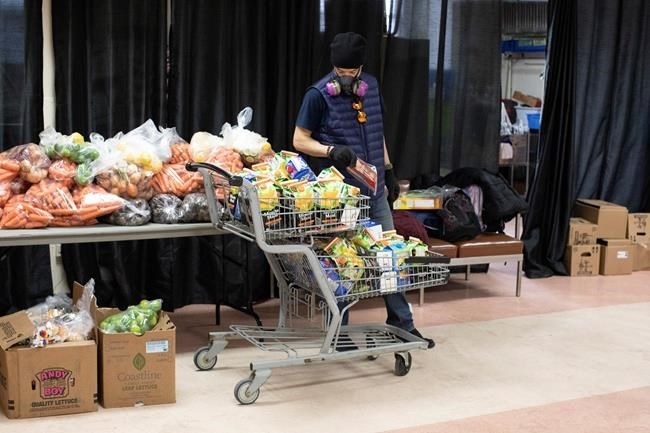
A volunteer at the Grant African Methodist Episcopal Church sorts through a food delivery in Toronto on Wednesday March 18, 2020 ahead of their weekly food bank service.
Image Credit: THE CANADIAN PRESS/Chris Young
March 19, 2020 - 9:30 AM
VANCOUVER - Food banks and non-profit organizations that help the most vulnerable say they need a helping hand to get through the novel coronavirus pandemic.
Non-profit organizations and charities say the impact from COVID-19 has been immediate and may also have ripple effects in the long-term.
Andrea Seale, chief executive officer of the Canadian Cancer Society, said the organization is in the process of adjusting all its programs and services.
"The impact is going to be very considerable, not just on donations. A more immediate impact is about the services we're delivering because we're right at the frontline," she said in an interview.
The society operates seven lodges across the country that have between 20 and 40 rooms where people can stay when undergoing treatment, she said, noting they had to cut the occupancy in half to practise social distancing.
"So, that means there's going to be more people who are struggling to find a place to stay when they need to travel for their treatment."
Most drivers who take people to appointments are seniors who are now at home taking precautions, which means there are fewer people to help those in need, she said.
Seale said the organization raises about $200 million a year and she expects that will drop. The pandemic also struck just as the cancer society was about to enter the height of the fundraising season, she said.
"April is what we call daffodil month," she said.
"Everything's been cancelled for April, which will probably be a drop of about $20 million in April alone."
Chris Hatch of Food Banks Canada said he has "several worries" about how COVID-19 will affect them.
"We've got over 5,000 food banks across Canada and what we're seeing is a dramatic drop in volunteers right now," he said.
Most of the food banks are volunteer-driven and many volunteers are seniors, who are staying home because they are a vulnerable, he explained.
"We have a real challenge in terms of staffing and running our food bank operations across the country," Hatch added.
He also fears that the food supply will not be replenished fast enough.
"The food banks currently have about a 10- to 14-day supply and we're just not seeing food donations coming in as fast as we need them to come in to replenish our supply," Hatch said.
"The thing I'm worried about is what's the demand going to be down the road as this coronavirus impact really hits and people are being laid off, shifts are cancelled, and people lose their jobs. And in the long-term what happens to people if we do go into a recession?"
Hatch said he was a frontline food bank worker during the 2008 recession.
"I can tell you that people who never thought they'd ever have to use a food bank all of a sudden had to use a food bank, and I think if we go into a recession we'll see that again."
Food banks across Canada saw a drop in food and funding at the time, he said, recalling having to ration food.
He fears a repeat.
"We're not there yet here, and I hope we don't get there, but that's what we saw in 2008."
Over one million people a month use food banks across Canada with children and seniors being a significant number of those, he said.
Cynthia Boulter, chief operating officer of the Greater Vancouver Food Bank, said the organization has had to reconfigure its delivery process because of social distancing.
The food bank is pre-packaging groceries, which means more help is needed at a time when volunteers are cancelling because of health concerns, she said.
While they have seen a slight rise in donations, she said she anticipates they will have to purchase more food but won't be able to get the deals they normally do because of demand.
"We've been contacted by other food banks who said, 'Hey, we can't get any tuna, we can't get any peanut butter' because all the private citizens out there are hoarding the food and are over-purchasing and now there's nothing left for the food bank to buy," Boulter said.
She wonders about the short- and long-term implications arising from the pandemic as people experience a dip in incomes, she said.
"That's an unknown," she said.
"We're grateful for a bit of an influx of donations now because we're not sure the impact this is going to have."
Several community events, which would have brought in revenue and raised the food bank's profile have also been cancelled.
Food banks are essential services so shutting them down or working from home aren't options, she said.
"People count on us and we want to continue our service," Boulter said.
"It's food. How do you shut that down for 30 days?"
This report by The Canadian Press was first published March 19, 2020.
News from © The Canadian Press, 2020